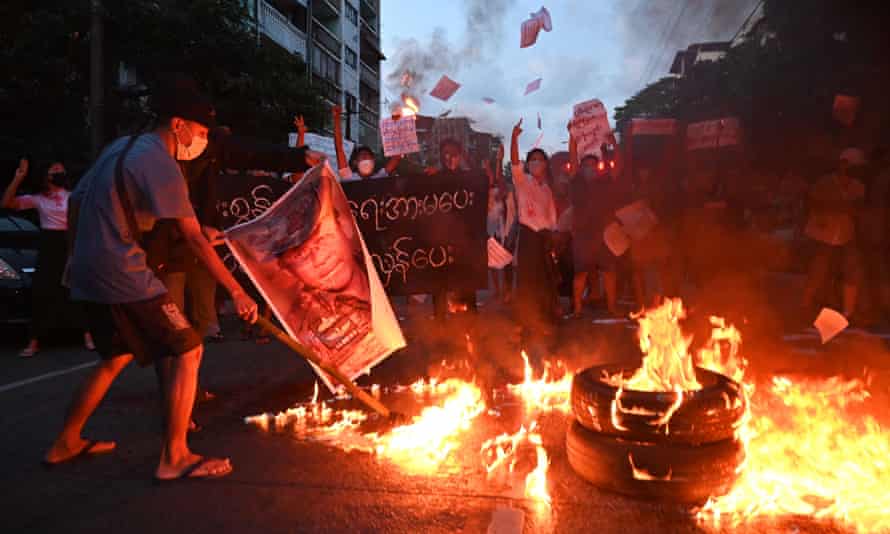Myanmar’s top general has vowed to intensify action against homegrown militia groups fighting the military-run government, saying the armed forces would “annihilate” them.
Gen Min Aung Hlaing, speaking at a military parade marking Armed Forces Day on Sunday, also urged ethnic minorities not to support groups opposed to army rule and ruled out negotiations with them.
The military seized power last year from the democratically elected government of Aung San Suu Kyi. Security forces have since used lethal force to suppress mass nationwide protests, resulting in the deaths of more than 1,700 civilians, according to a detailed tally compiled by the Assistance Association for Political Prisoners.
Forced to turn away from peaceful protests, many of those opposed to military rule took up arms, forming hundreds of militia groups called People’s Defence Forces – better known as PDFs. In some parts of the country, they’ve joined forces with well-organised, battle-hardened ethnic armed groups, which have been fighting for greater autonomy for decades.
Min Aung Hlaing, addressing thousands of military personnel during the parade in the capital Naypyidaw, said he would not negotiate with “terrorist groups and their supporters for killing innocent people” and threatening peace and security.
He said the military, known as the Tatmadaw, “will annihilate them to (the) end”, according to an official translation of his speech.
His government has declared major resistance organisations – regardless of whether they are directly engaged in armed struggle – as terrorist groups. Membership or even contact with them carries harsh punishment under law.
“I would like to highlight that there are no governments or armies worldwide that negotiate with any terrorist groups,” he said.
Despite a huge advantage in equipment and numbers, Myanmar’s military has struggled to crush the new militia units. Outgunned and outmanned, the PDFs have relied on support from local communities and knowledge of the terrain to carry out often surprisingly effective attacks on convoys, patrols, guard posts, police stations and isolated bases in remote areas.
The military is currently conducting operations in Sagaing, in central Myanmar, and in Kayah State, in the country’s east, using airstrikes, artillery barrages and the burning of villages. The army recently seems to have expanded its offensive into Chin State in the west and Kayin State in the south-east as well.

Last year’s Armed Forces Day was the single bloodiest since the military’s seizure of power on 1 February 2021. Security forces across the country opened fire on demonstrators, killing as many as 160 people.
Anti-military protests were held on Sunday despite the risks in Yangon, the country’s biggest city, and elsewhere. To avoid arrest or injury, urban street protests usually involve flashmobs, which quickly disperse before security forces crack down.
The main opposition group, the self-styled National Unity Government, urged people to join a “power strike” on Sunday night by switching off the lights and their televisions for 30 minutes while the military parade was broadcast on state-run TV channels.
The group said the strike was also intended to protest daily power outages. The blackouts started several months ago, and the government blames them on high gas prices and damage to power lines caused by sabotage.
The US, European Union and 20 other countries issued a statement marking Armed Forces Day by recalling “those killed and displaced by violence over the last year, including at least 100 people killed on this day alone one year ago”.
It called on the military to cease its violence and return to democratic rule, and urged countries not to supply arms to Myanmar.
The US, UK and Canada on Saturday imposed the latest in a series of coordinated sanctions on senior military officials and business leaders who allegedly act as arms dealers for Myanmar’s army.




